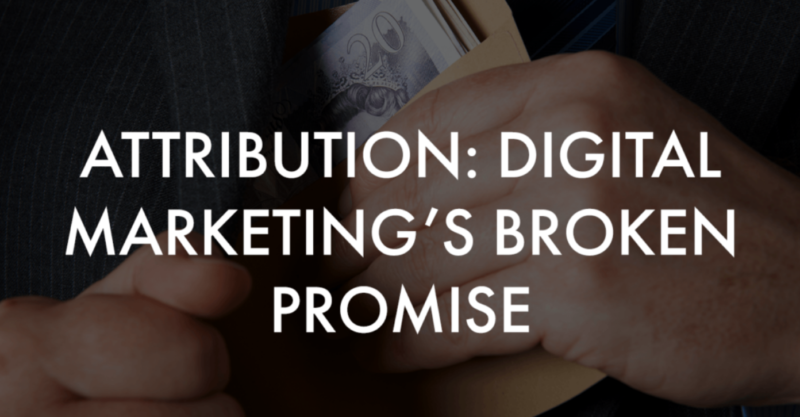Current Attribution Solutions ‘Verging On Useless’, Say Digital Marketers – Survey

Lack of credible attribution renders marketers susceptible to pressure to invest in ‘favourite’ channels, with ‘maximising ROI’ just a pipedream paid lip-service
Digital marketing managers have slammed current attribution solutions as verging on useless, in a new survey commissioned by QueryClick. Unreliable or false attribution leaves almost 90% of marketers afraid to invest in activities with any kind of long-term payback because of their inability to prove the value. Fewer than one-in-seven marketers find that adjusting their marketing investments based on attribution insights delivers the predicted results. Overall, the survey reveals that marketers find current attribution insights tools are of negligible, arguably negative, value.
In the absence of credible attribution insights, more than two-thirds of respondents (67.5%) report that internal stakeholder pressure restricts their option to invest in marketing activity that has a longer payback period than last-click measures. Six in ten respondents feel under pressure to over-invest in Paid Search because of its instant results and easy measurability, only 15% of respondents feeling no pressure to do so.
As a consequence, only 14.5% of respondents disputed the idea that their SEO and PPC strategies are misaligned for maximum overall return on their digital marketing investments.
Digital marketing agencies – which often claim to help their clients maximise ROI – are also held responsible for sub-optimal ROI by respondents: a substantial 60.5% agree that agencies tend to over-focus on PPC because it enables them to demonstrate immediate results, even though doing so may not maximise ROI for the client.
“In reality it’s irrelevant whether the pressure to invest in short-term measures like PPC came first and the lack of credible attribution to resist that pressure came second, or whether the unacknowledged deficiencies of attribution are causing marketing managers, their managers and agencies to default to short-term measures like PPC. The fact is that, after twenty years of everything digital being supposedly measurable, attribution is digital marketing’s dirty secret; a huge broken promise that will cost UK companies a significant proportion of the £15bn it will spend directly on digital marketing this year alone – and far, far more when you factor in the missing return on that investment.”
The survey report, Attribution: Digital Marketing’s Broken Promise, is available to download here.
Key survey responses:
- 58% of respondents feel constrained by their current attribution model(s) from implementing marketing activities with a long-term payback, with only 11% in disagreement
- faced with the statement “Investment changes we make based on attribution insights generally fail to deliver the predicted results”, 61.5% of respondents agreed and fewer than one in seven disagreed
- over 90% of all respondents apply more than one attribution model, with Data-Driven (21.5%), Position-Based (20.5%) and First Interaction (12.5%) accounting for over half of respondents’ primary attribution models
- marketers using the third-most-popular First Interaction attribution model are disproportionately unlikely to find their attribution insights helpful in changing their investment strategies, followed by marketers using Position-Based and Last Click models. Marketers using Data-Driven attribution are most likely to find their insights of value
- asked directly, almost 6 in 10 respondents (58.5%) suspect that their SEO and PPC strategies are not aligned for maximum overall return on investment (ROI) for their marketing budgets; only 14.5% disagreed
- asked indirectly, amid a question about the primary reason why their SEO and PPC strategies are misaligned, the proportion of respondents confident of alignment dropped even further, to just 5.5%
The latter statistic suggests 94% of respondents know full-well that their investments are sub-optimal. Primary reasons for this varied, headed by budget – always an easy target – on 26%. However management pressure to focus on a particular channel (22%), decisions made by agency (16%), decisions made by respondent and their team (16%) and inaccurate/no attribution (14%) followed closely.
Given the experience and seniority of respondents, potential explanations for this are limited but include:
- management has access to better information than the digital marketing team, but isn’t sharing (unlikely)
- management is taking a short-term view and wants immediate results at the expense of long-term optimisation of ROI
- the digital marketing team does not have sufficient credible information to be able to resist management pressure
Liversidge: “The survey tells us time and again that attribution is something done as a matter of course, but without much conviction, and rightly so: if the insights gleaned from historical analysis cannot help marketers to perform better ‘next time’, then the accuracy of that historical analysis must be in doubt. When we factor in that marketers feel under pressure from management and agencies to invest in specific channels, we might also speculate that pretty much everyone is aware that current digital marketing attribution is little more than an unacknowledged charade,” he added.
QueryClick brought a Unified Analytics solution, Corvidae, to market in 2018. Using a completely new approach to attribution, it blends online and offline data, of any type or quality, using a patented machine-learning approach. It cleanses marketing data and reveals up to 334% more data for attribution than any other available solution. During its first pilot, Corvidae delivered a 37% media spend reduction and a £976k revenue uplift across £11.8m of multichannel media spend, giving an overall ROI of 40:1 for the client.
Notes about the survey
- Our respondents were all digital marketing professionals from retail (UK top 500), travel (UK top 100) or finance (UK top 100) businesses. To ensure respondents worked ‘at the coalface’, respondents were restricted to marketing managers and senior marketing managers (with or without ‘digital’ in their job title) who have a say in the investment decisions across multiple digital marketing channels. “Directors” and “Heads of”, for example, were excluded, as were more junior roles.
- Of 200 respondents, 175 were male and 25 female. Of the 200, 175 were aged between 35 and 54, suggesting that, at such premium companies, “manager” remains a title of value, and most likely reflecting significant experience.
- The survey was carried out on behalf of QueryClick by independent survey consultants Censuswide, over a two week period in the first half of May 2019. Respondents were sourced by Censuswide according to the parameters above, with responses collected online. Qualifying questions ensured that responses were collected only from respondents meeting the definition above. Both the survey and Censuswide are compliant with the Market Research Society code of conduct.
Own your marketing data & simplify your tech stack.
Have you read?
I have worked in SEO for 12+ years and I’ve seen the landscape shift a dozen times over. But the rollout of generative search engines (GSEs) feels like the biggest...
As you will have likely seen, last week Google released the March 2024 Core Algorithm Update. With it, comes a host of changes aiming to improve the quality of ranking...
After a year of seemingly constant Google core updates and the increasingly widespread usage of AI, the SEO landscape is changing more quickly than ever. With this rapid pace of...


